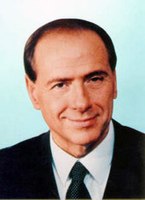The first Berlusconi government was the 51st government of the Italian Republic.
First Berlusconi government | |
|---|---|
51st Cabinet of Italy | |
 | |
| Date formed | 10 May 1994 |
| Date dissolved | 17 January 1995 (253 days) |
| People and organisations | |
| Head of state | Oscar Luigi Scalfaro |
| Head of government | Silvio Berlusconi |
| Deputy head of government | Roberto Maroni Giuseppe Tatarella |
| No. of ministers | 26 (incl. Prime Minister) |
| Member parties | FI, MSI, LN, CCD, UdC, FLD |
| Status in legislature | Centre-right coalition |
| Opposition parties | PDS, PPI, PRC, PS, FdV, AD, PSI, LR |
| History | |
| Election | 1994 election |
| Legislature term | XII Legislature (1994–1996) |
| Predecessor | Ciampi government |
| Successor | Dini government |
It was the first right-wing and non-Christian Democrats government since World War II.[1]
Berlusconi resigned on 22 December 1994.
History
editIn order to win the March 1994 general election Berlusconi formed two electoral alliances: Pole of Freedoms with the Northern League in northern Italian districts, and another, the Pole of Good Government, with the neo-fascist Italian Social Movement in central and southern regions. He did not ally with the latter in the North because the League disliked them. As a result, Forza Italia was allied with two parties that were not allied with each other.
Berlusconi launched a massive campaign of electoral advertisements on his three TV networks. He subsequently won the elections, with Forza Italia garnering 21% of the popular vote, the highest percentage of any single party.[2] One of the most significant promises that he made in order to secure victory was that his government would create "one million more jobs". He was appointed prime minister in 1994, but his term in office was short because of the inherent contradictions in his coalition: the League, a regional party with a strong electoral base in northern Italy, was at that time fluctuating between federalist and separatist positions, and the Italian Social Movement was a nationalist party that had yet to renounce neo-fascism at the time. In December 1994, following the communication of a new investigation from Milan magistrates that was leaked to the press, Umberto Bossi, leader of the Northern League, left the coalition claiming that the electoral pact had not been respected, forcing Berlusconi to resign from office and shifting the majority's weight to the centre-left side. The Northern League also resented the fact that many of its MPs had switched to Forza Italia, allegedly lured by promises of more prestigious portfolios. In 1998 various articles attacking Berlusconi were published by Northern League's official newspaper (La Padania), with titles such as ""Fininvest (Berlusconi's principal company) was founded by Cosa Nostra".
Berlusconi remained prime minister for a little over a month until his replacement by a technocratic government headed by Lamberto Dini. Dini had been a key minister in the Berlusconi government, and Berlusconi said the only way he would support a technocratic government would be if Dini headed it. In the end, however, Dini was only supported by most opposition parties and by the League but not by the centre-right coalition.
Investiture vote
edit| 18–20 May 1994 Investiture votes for the first Berlusconi government | |||
|---|---|---|---|
| House of Parliament | Vote | Parties | Votes |
| Senate of the Republic | Yes | LN, MSI, FI, CCD, Others | 159 / 314
|
| No | PDS, PPI, PRC, FdV-LR, PSI, SVP | 153 / 314
| |
| Abstention | Others | 2 / 314
| |
| Chamber of Deputies | Yes | LN, FI, MSI, CCD | 366 / 611
|
| No | PDS, PRC, PPI (33), AD, PSI, PS, SVP-UV, Others | 245 / 611
| |
| Abstention | None | 0 / 611
| |
Party breakdown
edit- Forza Italia (FI): Prime minister, 8 ministers and 12 undersecretaries[3]
- Italian Social Movement (MSI): 5 ministers and 12 undersecretaries
- Northern League (LN): 5 ministers and 9 undersecretaries
- Christian Democratic Centre (CCD): 2 ministers and 1 undersecretary
- Union of the Centre (UdC): 2 ministers
- Liberal Democratic Foundation (FLD): 1 minister and 1 undersecretary
- Independents: 2 ministers and 1 undersecretary
Composition
edit- ^ Secretary of the Council of Ministers.
- ^ Delegated to entertainment, tourism and sport.
- ^ Delegated to the Civil Protection.
- ^ Delegated to urban areas and Rome Capital.
References
edit- ^ Montalbano, William D. (11 May 1994). "Italian Premier Forms Rightist Government". Los Angeles Times. Retrieved 27 February 2013.
- ^ "Elezioni della Camera dei Deputati del 27 Marzo 1994" (in Italian). Italian Chamber of Deputies. Archived from the original on 12 June 2009.
- ^ De Giorgi, Elisabetta; Francesco Marangoni (2009). "The First Year of Berlusconi's Fourth Government: Formation, Characteristics and Activities". Bulletin of Italian Politics. 1 (1): 87–109.